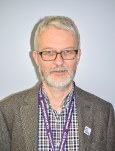Reflections from Colin Ross, Policy and Practice Development Officer
 Participating in an international conference like the World Community Development Conference is a massive privilege, even if it doesn’t always feel that way when experiencing the delights of budget air travel.
Participating in an international conference like the World Community Development Conference is a massive privilege, even if it doesn’t always feel that way when experiencing the delights of budget air travel.
This is my attempt to share at least something of the experience and the learning from the conference, which was organised by the International Association for Community Development (IACD), Maynooth University and Community Work Ireland in the last week in June,.
A primary reason for the CLD Standards Council to take part in the conference was that we had been working with IACD to develop “shared international standards for community development practice”. The Standards were successfully launched at the conference and I’ll come back to that. The conference gave me a far better understanding of why IACD colleagues saw the Standards as a timely and essential development.
The first impression was of the spread of participants from around the world. IACD (which celebrated its 65th year in 2018) has had a strong “Anglophone” bias – and base – and there was strong representation at the conference from for example Australia, New Zealand and the USA. But there were participants from a wide range of countries in Africa, Asia and South America, although fewer from Europe (other than the UK and Ireland).
Conference proceedings started with a song – members of a university choir, unannounced and appearing from scattered points in the hall. A tone of openness was set, supported by the community work students who were the conference “stewards”. Conversations as much as formal sessions showed the way in which people use community development methods to grapple with the impact of extreme weather events, poverty and poor sanitation in the Himalayas, or the aftermath of conflict in Colombia or the impact of austerity on public services in Hong Kong.
Two of the speakers in the plenary sessions made a particular impression on me. Mary Robinson spoke about how she came to her current advocacy for climate justice “not as a scientist or an environmental lawyer…It was because of the impact on people, and the impact on their rights – their rights to food and safe water, health, education and shelter… Climate justice transforms climate change from a discourse on greenhouse gases and melting icecaps into a civil rights movement with the people and communities most vulnerable to climate impacts at its heart.” The text of Mary’s speech is available on her organisations website.
Mary Robinson impressed as someone who has worked through the formal processes of government and used them to work and advocate for the empowerment of those excluded from power and resources. I can remember a period of a few months or weeks in 1969 when Bernadette McAliskey (Devlin as she then was) also seemed to be on the “inside”, as the UK media were fascinated by a 21 year old woman from Derry representing the Northern Ireland civil rights movement at Westminster. Almost 50 years later the same woman – small, ordinary looking, and one of the most remarkable orators I’ve heard – explained to the conference that she’d only become an MP by accident. She spoke about her community development work on migrant workers’ rights, and challenged us to confront issues about power. Otherwise, she said, we’ll always be “lurking in community development”, as she imagined those in power describing her current activities.
The same issue had come through in the debate on shared international standards. Is the whole concept of professionalism, and the concern with standards that flows from it, a way of negating practice that seeks to challenge inequality and oppression, as some IACD members argued? Or are they an important means of ensuring that community development practice embodies its stated values, of widening and deepening its impact, and of sharing learning?
In the workshop focusing on how the Standards can be used, and elsewhere at the conference, there was strong support for the view that the Standards can be an effective way of spreading understanding of community development and improving value-based practice. There is strong interest in using them, for example in Nigeria, the USA, India and Russia (along with other former parts of the Soviet Union).
The standards are availble to download from the IACD website
In Scotland, we have an established framework of values, Code of Ethics and competences for CLD, supported by national occupational standards for community development and youth work. But we need to ensure that these continue to be fit for purpose: using the international Standards may be a productive way of thinking afresh about how our framework can explain, challenge and develop practice.
Over the 3 days of the conference, and a day’s study tour in Dublin, there were a wealth of other insights and experiences to spur fresh thinking. One example – hearing about a campaign for greater equality in education in Ireland, and “collective impact” approaches in the USA (school reform seen as one part of wider transformational change) was the best stimulus to finding new ways to influence what we call “education reform” in Scotland.
The 2019 World Community Development Conference will be in Dundee (See web page) so there is a great opportunity for CLD practitioners across Scotland to attend. Next June is not a long time away so worth thinking about how you, colleagues and people you work with in communities could benefit from participating – and how to make it possible. If you live in Scotland you won’t even need to check the size of your bag.
Colin Ross
Policy and Practice Development Officer for the CLD Standards Council.
